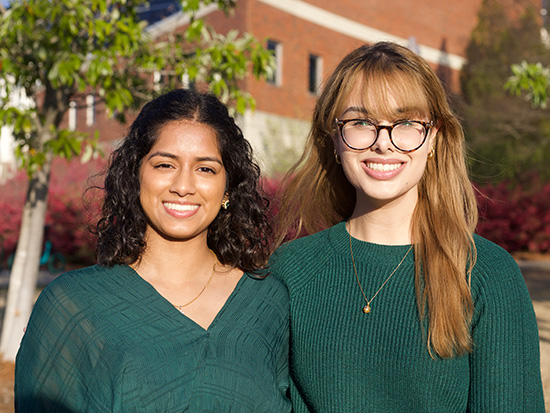University of Alabama at Birmingham Sarah Wilson and Wajiha Mekki students Wajiha Mekki and Sarah Wilson are among the 500 students out of 5,000 applicants who have been selected for the United States Department of State’s Bureau of Educational and Cultural Affairs Critical Language Scholarship Program. This summer, they will participate in the Spark program, CLS’ new online intensive language learning program designed for beginners in Arabic, Chinese and Russian.
Sarah Wilson and Wajiha Mekki students Wajiha Mekki and Sarah Wilson are among the 500 students out of 5,000 applicants who have been selected for the United States Department of State’s Bureau of Educational and Cultural Affairs Critical Language Scholarship Program. This summer, they will participate in the Spark program, CLS’ new online intensive language learning program designed for beginners in Arabic, Chinese and Russian.
“The CLS Spark program is a new initiative that allows students who traditionally may not be able to complete a program abroad the opportunity to receive an immersive language learning experience in a virtual format,” said Kamina Purdue, assistant director in the Office of National and International Fellowships and Scholarships. “We are so excited to have our first two recipients for the award and look forward to helping more students gain such amazing opportunities.”
Mekki, a double major in political science and cancer biology from Lawrenceville, Georgia, and Wilson a neuroscience major from Jackson, Tennessee, will spend this summer studying Arabic through this virtual initiative for students to learn languages critical to national security, economic prosperity and engagement with the world. Both Honors College students will improve their command of all four modalities in these languages which include listening, speaking, reading and writing.
Both Mekki and Wilson are also pursuing a Master of Public Health degree at the School of Public Health simultaneously with their bachelor’s degrees from the College of Arts and Sciences and consider Arabic as a gateway to many populations across the world.
“Arabic is a very nuanced language that reaches hundreds of different communities,” Mekki said. “Being able to learn Arabic and build upon my language competencies, I will be able to expand the possibilities to connect and uplift additional communities.”
Wilson aspires to learn more about the Middle East’s environmental status and believes learning Arabic will enhance her understanding of climate issues.
“As a public health student, I am interested in learning more about the Middle East’s environmental status,” Wilson said. “I believe learning Arabic will help me discover more about the culture and connect with others in the MENA region.”
These students will attend online classes and activities facilitated by native speakers at a host institution abroad. The program will feature 10 hours of intensive live group instruction a week, cultural activities and individual consultations with language instructors at host institutions, and monthly professional development workshops.